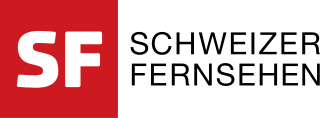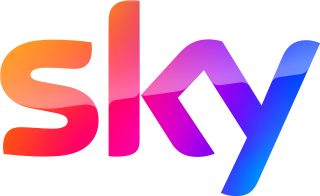
The four national languages of Switzerland are German, French, Italian, and Romansh. German, French, and Italian maintain equal status as official languages at the national level within the Federal Administration of the Swiss Confederation, while Romansh is used in dealings with people who speak it. Latin is occasionally used in some formal contexts, particularly to denote the country.

ARD is a joint organisation of Germany's regional public-service broadcasters. It was founded in 1950 in West Germany to represent the common interests of the new, decentralised, post-war broadcasting services – in particular the introduction of a joint television network.

Télévision Suisse Romande was a TV network with two channels: TSR 1 and TSR 2. They were the main French-language channels in Switzerland, part of SRG SSR. They provided content for TV5Monde. Radio Suisse Romande and Télévision Suisse Romande merged in 2010 to create Radio Télévision Suisse.

Switzerland has participated in the Eurovision Song Contest 63 times since making its debut at the first contest in 1956, missing only four contests, in 1995, 1999, 2001 and 2003. Switzerland hosted the first contest in 1956 in Lugano, and won it. Switzerland won the contest again in 1988, with the 1989 contest being held in Lausanne.

The Swiss Broadcasting Corporation is the Swiss public broadcasting association, founded in 1931, the holding company of 24 radio and television channels. Headquartered in Bern, the Swiss Broadcasting Corporation is a non-profit organisation, funded mainly through radio and television licence fees (79%) and making the remaining income from advertising and sponsorship.

Schweizer Fernsehen was the German-language division of SRG SSR, in charge of production and distribution of television programmes in Switzerland for German-speaking Switzerland. It had its head office in Zürich. Its most viewed programme was Tagesschau (news), daily at 7:30 pm.

Romandy is the French-speaking historical and cultural region part of Switzerland. In 2020, about 2 million people, or 22.8% of the Swiss population, lived in Romandy. The majority of the romand population lives in the western part of the country, especially the Arc Lémanique region along Lake Geneva, connecting Geneva, Vaud, and the Lower Valais.

3sat is a free-to-air German-language public service television channel. It is a generalist channel with a cultural focus and is jointly operated by public broadcasters from Germany, Austria (ORF) and Switzerland. The coordinating broadcaster is ZDF, at whose Mainz facility the broadcasting centre with studios for in-house productions is located.
SRF zwei is a Swiss German-language free-to-air television channel run under the public SRG SSR broadcasting group.

Rundfunk Berlin-Brandenburg, commonly shortened to RBB, is an institution under public law for the German states of Berlin and Brandenburg, based in Berlin and Potsdam. RBB was established on 1 May 2003 through the merger of Sender Freies Berlin (SFB) and Ostdeutscher Rundfunk Brandenburg (ORB), based in Potsdam, and is a member of the Association of PSBs in the Federal Republic of Germany (ARD).

The Radio Suisse Romande (RSR) was an enterprise unit within public-broadcasting corporation SRG SSR. It is responsible for the production and transmission of French-language radio programmes in Switzerland. RSR's headquarters are situated in Lausanne. Radio Suisse Romande and Télévision Suisse Romande merged in 2010 to create Radio Télévision Suisse.
Switzerland participated at the Eurovision Song Contest 2006 with the song "If We All Give a Little" written by Ralph Siegel and Bernd Meinunger. The song was performed by the group six4one, which was internally selected by the Swiss broadcaster SRG SSR idée suisse in November 2005 to represent the nation at the 2006 contest in Athens, Greece. "If We All Give a Little" was presented to the public as the Swiss song on 18 March 2006.
Switzerland participated at the Eurovision Song Contest 2007 with the song "Vampires Are Alive" written by René Baumann and Axel Breitung. The song was performed by DJ BoBo, which is the artistic name of singer René Baumann who was internally selected by the Swiss broadcaster SRG SSR idée suisse in December 2006 to represent the nation at the 2007 contest in Helsinki, Finland. "Vampires Are Alive" was presented to the public as the Swiss song on 21 February 2007.
Switzerland participated in the Eurovision Song Contest 2004 with the song "Celebrate" written by Greg Manning. The song was performed by Piero Esteriore and the MusicStars. The Swiss broadcaster SRG SSR idée suisse returned to the Eurovision Song Contest after a one-year absence following their relegation from 2003 as one of the bottom five countries in the 2002 contest. The Swiss entry for the 2004 contest in Istanbul, Turkey was selected through the national final Eurosong 2004, organised by the broadcasters part of SRG SSR idée suisse. The Swiss-German/Romansh broadcaster Schweizer Fernsehen der deutschen und rätoromanischen Schweiz, the Swiss-French broadcaster Télévision Suisse Romande (TSR) and the Swiss-Italian broadcaster Televisione svizzera di lingua italiana (TSI) each conducted varying selections and a total of twelve entries were selected to advance to the televised national final—four artists and songs from each selection. The twelve finalists performed during the national final on 6 March 2004 where two rounds of regional televoting ultimately selected "Celebrate" performed by Piero Esteriore and the MusicStars as the winner.

SRF info is a German-language Swiss television channel owned by Schweizer Radio und Fernsehen. The channel started trial broadcasts in May 1999 and regular broadcasts in January 2001.

HD suisse is a former Swiss high-definition television channel operated by the public service broadcaster SRG SSR. This was the 8th channel launched by SRG SSR, and the first Swiss television channel available in high definition.
Television in Switzerland was introduced in 1950, with regular broadcasts commencing in 1953. People who live in Switzerland are required by law to pay a television licence fee, which is used to finance the public radio and television service SRG SSR. Since 1 January 2021, the Licence fee cost in all the linguistic regions of Switzerland is 355 CHF per year or 83.75 CHF quarterly, counting both radio and television licences. All licence fee payers are entitled under the law to services of equal quality. The fee is charged per household and not per person, with empty dwellings being exempt. The fee is determined by the Federal Council.
Switzerland participated in the Eurovision Song Contest 2000 with the song "La vita cos'è?" written by Bernie Staub and Thomas Marin. The song was performed by Jane Bogaert. The Swiss broadcaster SRG SSR idée suisse returned to the Eurovision Song Contest after a one-year absence following their relegation from 1999 as one of the six countries with the least average points over the preceding five contests. The Swiss entry for the 2000 contest in Stockholm, Sweden was selected through the national final Concours Eurovision 2000, organised by SRG SSR idée suisse. Six entries performed during the national final on 29 January 2000 where a combination of jury voting and public voting selected "La vita cos'è?" performed by Jane Bogaert as the winner.

Sky Switzerland is a Swiss media company based in Neuchâtel, which supplies over-the-top pay television and video on demand accessible through the Internet in Switzerland.
Events in the year 1985 in Switzerland.













